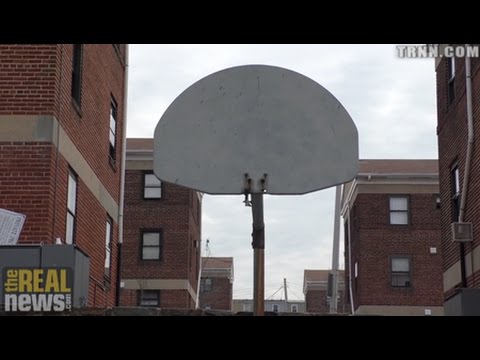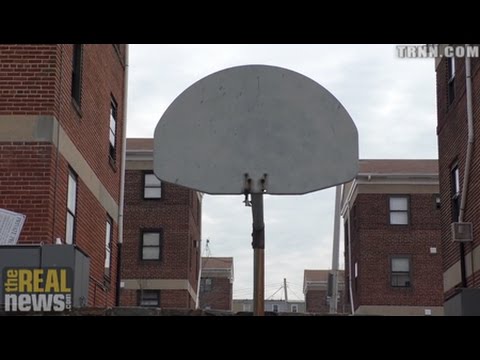
A week before Freddie Gray died from injuries sustained during police custody, TRNN Executive Producer Eddie Conway walked the neighborhood of Gilmor Homes with former Baltimore City council President Lawrence Bell. There, he spoke to Bell about his efforts to fix the basketball court that had sat in disrepair for years.
Host: Eddie Conway
Photography: Cameron Granadino
Script: Stephen Janis
Voiceover: Stephen Janis
Editing: Stephen Janis
Story Transcript
STEPHEN JANIS, INVESTIGATIVE REPORTER, TRNN: Welcome to The Real News Network in Baltimore. My name is Stephen Janis and I’m an investigative reporter. The death of Freddie Gray has brought international attention to Baltimore City, and in particular its police department. The Real News Network has been covering police brutality in Baltimore for several years. Last week before Freddie Gray’s death we happened to be in the neighborhood taking a tour of the conditions of Gilmor Homes where Freddie lived before he was killed by police. Gilmor Homes has suffered neglect from the city. Specifically, a basketball court. It was here that we met Lawrence Bell, former city council president, and talked about problems with the city, and the conditions that precipitate police brutality in the community. He was a man who could have been mayor, but his life took a different path when he lost a controversial election to a then-councilman and now presidential candidate Martin O’Malley in 1999. In many ways it was a loss that has defined the city since. But for Lawrence Bell, it was simply a painful defeat. A once rising star and popular councilman for what is now the Eighth District, Bell was elected council president in 1995 and seemed on the verge of assuming the city’s top job. But it was a promise unfulfilled. So shortly after O’Malley assumed office he moved to Atlanta, and now he has returned home. In part to renew ties with family and friends, but he’s also engaging in the dialog about the city where he was born and raised. A dialog he says that has to happen in a community poised precariously between a hopeful future and the mistakes of the past. LAWRENCE BELL, FMR. BALTIMORE CITY COUNCIL PRESIDENT: I have a lot of interest in this community, and I’m saddened to see how things have gone downhill. JANIS: This week Bell joined The Real News correspondent Eddie Conway to talk about politics, crime and punishment, and what needs to happen to improve the city he loves. BELL: This city has been socially, economic and politically subdued and downtrodden so much the last several years that people don’t even complain about it anymore. And they’re afraid to. JANIS: The discussion took place against a symbolic backdrop for both men: a dilapidated basketball court in the Gilmor Homes Housing Project in West Baltimore. Left in disrepair by the city for nearly 17 years, Conway has raised money to fix the court, but the city has blocked his efforts. EDDIE CONWAY, PRODUCER, TRNN: So we got a company that’s certified, that does this, that’s donating some of the stuff. And they’re going to be in from the beginning to the end to make sure it’s done. JANIS: The city told us the community was divided on whether they wanted the court to be built. But residents we spoke to said they supported fixing it. RESIDENT: This [court] ain’t been up since I was, I was three. I ain’t seen these up–for my own [inaud.] eyes, I ain’t seen them up yet. JANIS: Neglect, Bell says, symbolic of how the city is run and for whom. BELL: People are smart enough and young people are smart enough to see what’s really going on, and they see the investments, or lack of investments, and what the values are. JANIS: Looking back, Bell says the sagging remainders of a once vital recreation facility symbolizes the priorities which have driven downtown development while neighborhoods like Gilmor Homes have continued to suffer from neglect. BELL: And by the early ’70s on, the jobs left, the drugs came in. And that has been the formula of the downfall of this community. JANIS: It’s a dual trajectory of poverty and wealth, progress and decay, that represents not just the underlying tension that prevents the city from growing but also a reflection of past policies that still have often unseen consequences. BELL: We as a community, number one, we’re not setting agendas to say what we want. Okay. And number two, we’re not holding people accountable. JANIS: Among them, the decision by Martin O’Malley to employ get-tough policing tactics like zero tolerance, which meant more money for cops and less for recreation. BELL: Martin O’Malley’s move toward incarcerating people and locking them up illegally, unconstitutionally, we’ve seen a mushrooming of the numbers of young black males with criminal records and arrest records. In many cases they were illegally detained, but they have these arrest records which are then again used to deny them employment. It’s almost like South Africa, really, to be very honest with you. A lot of people don’t want you to say that. But it is. JANIS: And the mounting use of tax breaks to stimulate growth downtown. BELL: I just think it’s unfortunate that we’re putting so much energy into people who already have money, who already have resources. We’re not doing enough here. JANIS: A path he hopes can bring prosperity to neighborhoods he says are the most deserving and least likely to get it. Part of it, he believes, will start here with a symbolic reversal of the policing philosophy known as broken windows, which said to improve a neighborhood you need to fix what’s broken by arresting people for nuisance crimes. Bell says it’s time to try healing with something more positive, like repairing a basketball court for a community that is still suffering from the wounds of the past, but has its eye fixed firmly on the future. Reporting from Baltimore, Stephen Janis for The Real News Network.
End
DISCLAIMER: Please note that transcripts for The Real News Network are typed from a recording of the program. TRNN cannot guarantee their complete accuracy.





